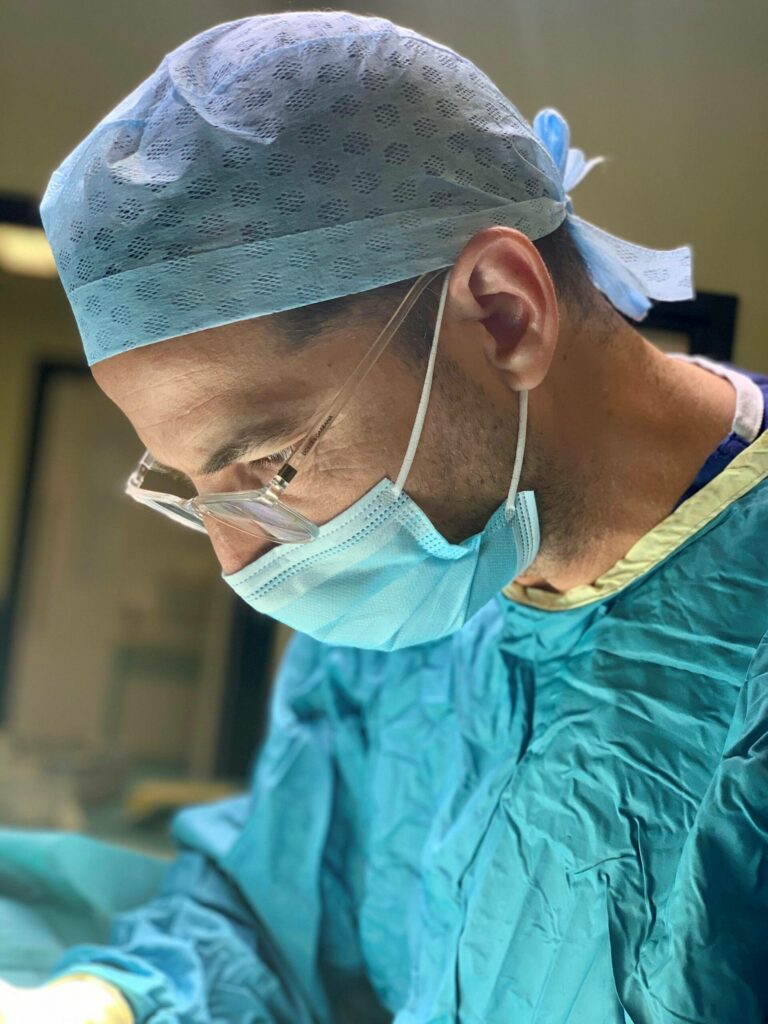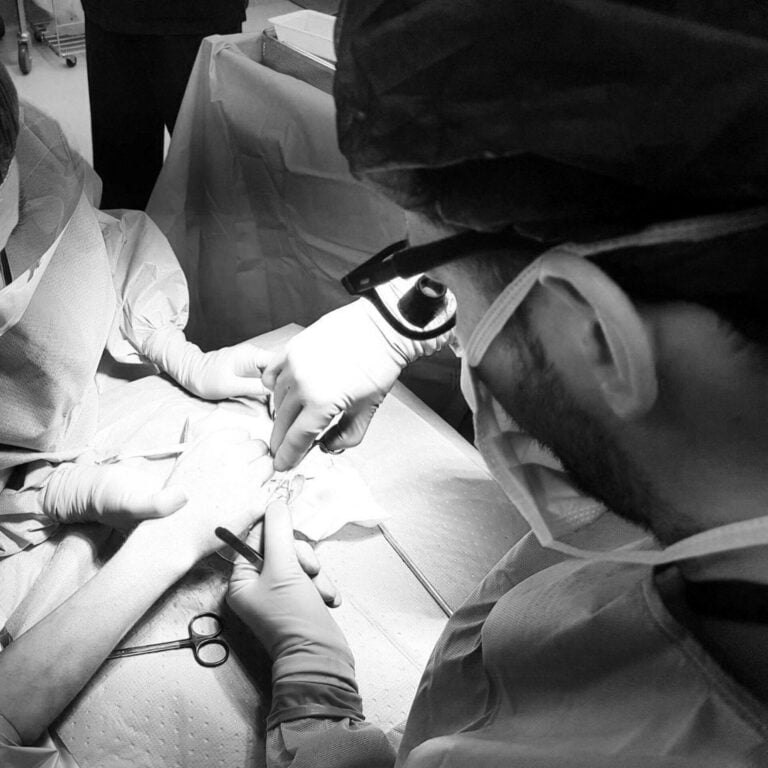It is with a sense of purpose and enthusiasm that specialist plastic surgeon Dr Foti Sofiadelis returned recently to Melbourne from the UK, where he lived with his family for a few years, working at prestigious hospitals in London, as a fellow of the Royal Australasian College of Surgeons.
Growing up in South Africa, in a close knit Greek community of around a hundred families in the city of Bloemfontein, the Greek surgeon feels strongly about giving back to the Hellenic community. He tells us that he would like to support the next generation of doctors in the field he has excelled in, whilst at the same time establishing his own private practice at The Avenue Hospital, in addition to consulting and operating at a number of public and private hospitals across Melbourne.
“I have indicated to the Hellenic Medical Society of Australia, and the HACCI that if there are any young doctors within their networks who need mentorship for navigating the pathway on surgical training, and career decisions, I’m happy to provide advice and guidance,” the Australian trained surgeon told Neos Kosmos, recalling how at the start of his career, he had often wished he had someone to turn to for guidance. He adds that since Hippocrates, medicine was always taught based on an apprenticeship model.
Though the specialist plastic and reconstructive surgeon is now based in Melbourne, he has led a fascinating life, living and working across three continents.
With roots from Mytilene, his fluency in Greek was one of the reasons he chose Melbourne as a young doctor, back in 2005, after completing his undergraduate training in South Africa. “I thought it would be an adventure to go to the other side of the world. The plan was to come here for one year and then go back to South Africa and finish my specialist training.”

But just as he was about to head back home, he met his future wife, Pamela, also of Greek origin.
“I recognised the value of working and living in the Australian society, in the healthcare sector, and then of course… love is the strongest force of all, I suppose,” he smiles, revealing the catalyst behind his decision to settle in Australia.
It was the second time in his life that he would have to weigh in and consciously choose his future path. A professional football player in his youth, Foti Sofiadelis tried for a while to pursue both passions at the same time. Train twice daily on the soccer pitch, whilst also attending university and exams. This of course proved impossible.
“There will always be that question of ‘What if?’ but, you know… there are no regrets.”
He was a teenager when he first felt an urge to learn more about medicine. Whilst helping out in his father’s shop, he was confronted by a distressing incident, during which a child had a seizure. “I felt hopeless and I felt that I was responsible, that I needed to help but couldn’t.”
During his first stint in Melbourne he became fascinated by the advances in plastic surgery. “I was intrigued by the ability to replant fingers and hands, to reconstruct, using the microscope, and really change lives, instantly. In surgery, using our technical skills you can treat a problem almost immediately,” Dr Sofiadelis said.
“We restore, rebuild, and make whole those parts which nature has given, but which fortune has taken away. Not so much that it may delight the eye, but it might buoy up the spirit and help the mind of the afflicted,” Dr Sofiadelis echoes the words of Gaspare Tagliacozzi, an Italian pioneer of plastic reconstructive surgery who lived in the 16th century.
“I think it is interesting that that quote was said so many centuries ago, and it’s still fundamentally important, pivotal to what we do.”
He refers as an example to a recent difficult surgery that was successful; Saving the finger of a young 13-year-old boy and restoring its function.
The boy was wearing a ring when he fell of a gate. His ring got stuck on the gate ripping his finger off, a tear which is often non salvageable in plastic surgery. It was a complex surgery, which required vein graphing (taking veins from the forearm and bridging the gap between the injured veins and arteries), and working under a microscope. “It was a five hour operation, but it was successful. I saw the child a few months later, he was moving his hand quite well.”
Apart from these sorts of complex microsurgeries, Dr Sofiadelis has extensive experience managing skin carcinomas and melanomas. He also specialises in face rejuvenation procedures and breast surgery.
In recent times the Greek surgeon has noticed a surge in requests for aesthetic interventions as people seem to be turning to specialist plastic surgeons rather than cosmetic surgeons for these procedures, especially after a few botched cosmetic surgeries hit the news last year. As a result the Australian Health Practitioner Regulation Agency (AHPRA) and the Medical Board of Australia launched an independent review of the regulation of health practitioners in the cosmetic surgery industry due to the risks they may pose to patients.

Not many people know the difference between a specialist plastic surgeon and a cosmetic surgeon, Dr Sofiadelis tells us. “In Australia, a specialist plastic surgeon goes through the formalised training, knows the anatomy and has worked for years through certain complex issues in order to deal with any complications or eventualities, problems that may arise from surgery. On the other hand the cosmetic surgeon has a very narrow skill set. They have gone through medical school and then completed a short course on cosmetic surgery, which means they might not know how to deal with potential complications.”
He accounts for the rise in demand for aesthetic procedures due to changing attitudes as well. “They have become somewhat accepted in society. They are not taboo anymore.”
“But, because we can do a facelift doesn’t mean we should do it. If a person says they want a facelift to salvage their relationship or they want to get a particular job, it is a red flag.” There are certain requirements, a screening of the patients in order for the surgeon to establish whether it is the right thing to do.
“And we look at a patient’s age. They have to be old enough to decide. Of course it’s different for a child who’s had a birth or a congenital difference, versus a 16-year-old who’s going through fundamental changes and uncertainties, which means a procedure like this is obviously inappropriate.”
Dr Sofiadelis is the only specialist plastic surgeon in Melbourne who is also fluent in Greek. Though the majority of the Greek population in Melbourne converse in English, there are the elderly Greeks who would find the process overwhelming if they couldn’t grasp the full context of the process due to a language barrier, he explains.
From Greece, to South Africa and now Australia, the doctor and his young family have close relations spread across three continents. This means that Greek school is an exciting activity for his young sons, as they make their way to Greece, as often as they can, for a big family reunion that takes place in Mytilene once a year.
For more information and articles about plastic surgery visit fotisofiadellis.com









